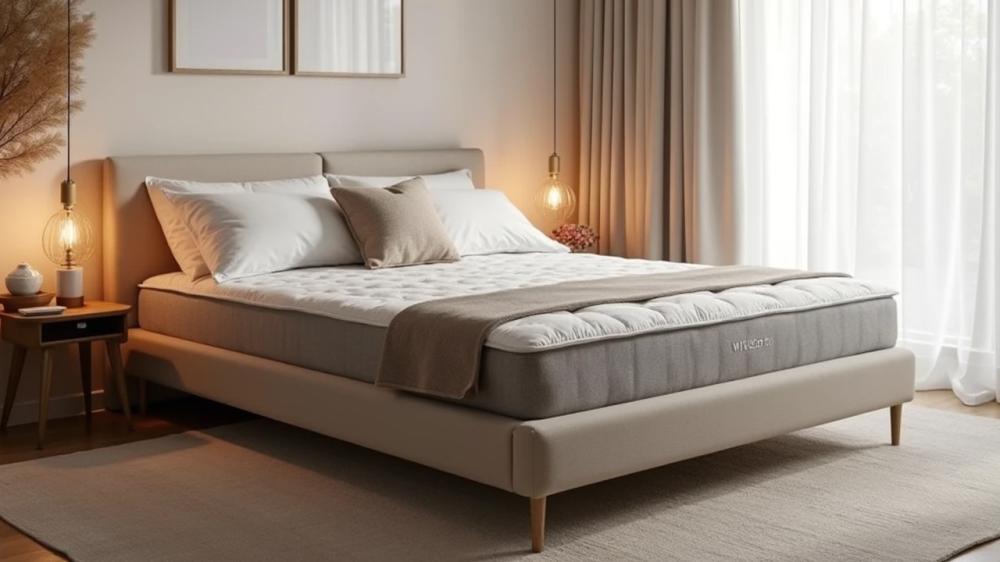
How Thick Should a Mattress Be? A Comprehensive Guide to Finding the Perfect Height
When it comes to buying a new mattress, most of us focus on factors like material, firmness, and price. However, mattress thickness is equally important and can significantly impact your comfort, support, and sleep quality. In this guide, we’ll explore how to determine the right mattress thickness for your needs and preferences.
Why Does Mattress Thickness Matter?
The thickness of a mattress affects more than just its appearance. It can influence:
- Support: Thicker mattresses often provide better support, especially for heavier individuals or couples.
- Comfort: The right thickness ensures proper spinal alignment and pressure relief.
- Ease of Use: A mattress that’s too tall or too short can make it difficult to get in and out of bed, particularly for those with mobility issues.
- Aesthetic Fit: The height of your mattress can impact the overall look of your bedroom and its compatibility with your bed frame.
Mattress Thickness Chart
Factors to Consider When Choosing Mattress Thickness
1. Sleeping Position
- Side Sleepers: Opt for a thicker mattress (12 to 14 inches) to cushion pressure points like shoulders and hips.
- Back Sleepers: A standard mattress (10 to 12 inches) offers adequate support while maintaining spinal alignment.
- Stomach Sleepers: A thinner mattress (around 10 inches) helps keep the hips level to avoid strain on the back.
- Combination Sleepers: A medium-thickness mattress (12 inches) can comfortably accommodate various positions.
2. Body Weight
- Lightweight Sleepers (<130 lbs): A taller mattress with softer comfort layers (12 inches or more) ensures proper contouring.
- Average Weight Sleepers (130–230 lbs): Standard mattresses (10 to 12 inches) are typically sufficient.
- Heavyweight Sleepers (>230 lbs): Look for thicker mattresses (12 to 14 inches) with robust base layers for durability and support.
3. Health and Mobility
- For individuals with mobility issues, a mattress height that aligns with your knees when seated at the bed edge (usually 18 to 25 inches from the floor) is ideal. A medium-thickness mattress combined with an appropriate bed frame can achieve this.
- Those with back pain should consider a mattress with multiple comfort layers for pressure relief and proper alignment.
4. Sleeping Arrangements
- Shared Beds: Couples or families should prioritize thicker mattresses (12 to 14 inches) to accommodate extra weight and motion transfer.
- Room Size: A thicker mattress can feel overwhelming in smaller bedrooms, while a thinner mattress may suit compact spaces better.
Pros and Cons of Thicker Mattresses
Advantages:
- Enhanced durability due to thicker base layers.
- Better support for heavier sleepers.
- Superior cushioning for pressure relief.
Disadvantages:
- More expensive due to the additional materials.
- Heavier and harder to move or rotate.
- May not fit all bed frames, particularly adjustable ones.
How to Test Mattress Thickness
Before committing to a mattress, consider these tips:
- In-Store Testing: Sit and lie on the mattress to evaluate its comfort and height.
- Trial Periods: Many brands offer trial periods to ensure the mattress meets your needs.
- Measure Your Bed Setup: Combine the mattress thickness with your bed frame height to ensure it suits your preferences and room layout.
FAQs About Mattress Thickness
1. Is a Thicker Mattress Always Better?
Not necessarily. While thicker mattresses offer more cushioning and support, the ideal thickness depends on individual needs like body weight, sleep position, and health conditions.
2. Can I Use a Thick Mattress on Any Bed Frame?
Not all bed frames can support the weight of a thick mattress. Check the frame’s specifications before purchasing.
3. What Is the Best Thickness for Couples?
Couples generally benefit from mattresses that are 12 to 14 inches thick, as these provide better motion isolation and support.
Final Thoughts
Selecting the right mattress thickness is a crucial step toward better sleep. By considering your sleeping habits, body weight, health needs, and bedroom setup, you can find a mattress that’s perfectly tailored to you. Remember, a well-chosen mattress isn’t just an investment in your bedroom – it’s an investment in your health and well-being.

